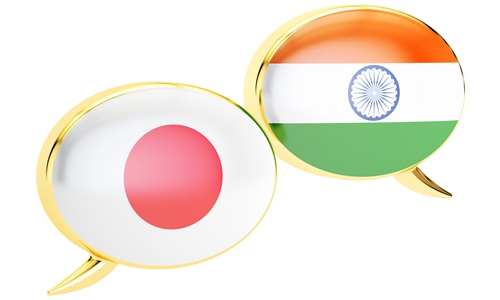HOME >> OPINION
Will RCEP be hurt if Japan refuses to join?
By Long Xingchun Source:Global Times Published: 2019/12/8 20:08:40

Illustration: IC
The first India-Japan 2+2 Foreign and Defense Ministerial Meeting, held in New Delhi on November 30, has drawn quite a bit of attention. Foreign and defense ministers of both countries exchanged views not only on bilateral cooperation, such as the Acquisition and Cross-Servicing Agreement (ACSA), but also on issues in the region relating to the South China Sea, Korean Peninsula and counter-terrorism. The upgrade of the dialogue from vice-ministerial to ministerial level this year indicates cooperation between Japan and India on political security has reached a new level.Both countries are driven by the need to strengthen bilateral cooperation. Generally speaking, Japan and India have encountered no conflicts or historical feuds. Even though the two belonged to different camps during the Cold War, they barely interacted.
After the WWII, with the development of India's national power and the increasing significance of the Indian Ocean and Africa for Japan, Tokyo started to pay more attention to New Delhi. India's Look East policy has been aiming at cultivating increasing economic and strategic relations with Southeast Asian countries. In recent years, New Delhi is expanding its efforts toward East Asia. Tokyo, against the backdrop, has become one of its key targets. In addition, both Japan and India have the ambition of becoming major powers. That being said, they are both concerned about regional and international hotspot issues.
The rise of China is a vital reason for India and Japan to come closer. Japan and India lie east and southwest of China, respectively. Tokyo and Beijing have historical and maritime disputes. India and China have territorial disputes. All these divergences cannot be resolved in the short term.
In the meantime, the gap of national power between China and these two countries is widening. In 2010, China surpassed Japan as the second largest economy in the world. Now, China's GDP is about 2.5 times of Japan's and 4.7 times of that of India. India and Japan are clearly aware that it is impossible to confront China individually. They both worry that China will start dominating Asian affairs. For example, when China called on ASEAN Plus Three (APT) - the Association of Southeast Asian Nations, China, Japan and South Korea - to promote the economic integration of East Asia, Japan insisted on turning the APT into ASEAN Plus Six, with Australia, New Zealand and India included. Moreover, Japan and India have tried to compete with China by proposing the Asia-Africa Growth Corridor (AAGC), which targets the China-proposed Belt and Road Initiative.
The US, the main driving force behind India-Japan cooperation, intends to build a multilateral cooperation system on the basis of its several bilateral alliances in Asia. India and Japan's ACSA is a typical case, since the major goal of the agreement is to permit Japan Self-Defense Forces to provide logistical supplies to US military. Be it former US president Barack Obama's rebalance to Asia-Pacific strategy or President Donald Trump's Indo-Pacific Strategy, they both encourage US allies in Asia to develop bilateral cooperation.
On November 29, Japanese Deputy Minister for Economy, Trade and Industry Hideki Makihara said in an interview with Bloomberg that his country will not sign the Regional Comprehensive Economic Partnership (RCEP) without India, and "all we are thinking of is negotiations including India." This draws more attention to whether Japan will withdraw from RCEP like India than the Japan-India 2+2 meeting itself.
In fact, all members of RCEP agree that India's accession is crucial. However, India believes that this is not in line with its own current interests.
Except for India, the other 15 participating countries, including Japan, believe that the RCEP meets their needs. Japan's possible withdrawal because of India will hence damage its credibility and hurt other members' interests. The trade agreement is still on track after India opted out. Although it could be a real blow for many members if Japan decides not to sign the deal, the RCEP will still continue to promote regional cooperation without them. Openness is one of the features of the RCEP. Thus, India and Japan will always be welcomed when they are ready.
Calling the RCEP a "China-backed" trade deal is irresponsible. Trying to thwart the deal in the name of China will not only damage regional cooperation in Asia, but also hurt relations between China and other countries. Under the circumstance that both China-India and China-Japan relations are improving, all three countries have the responsibility to work together and promote economic cooperation in Asia.
The author is director of the Center for Indian Studies at China West Normal University and research fellow at the Charhar Institute. opinion@globaltimes.com.cn
Posted in: ASIAN REVIEW